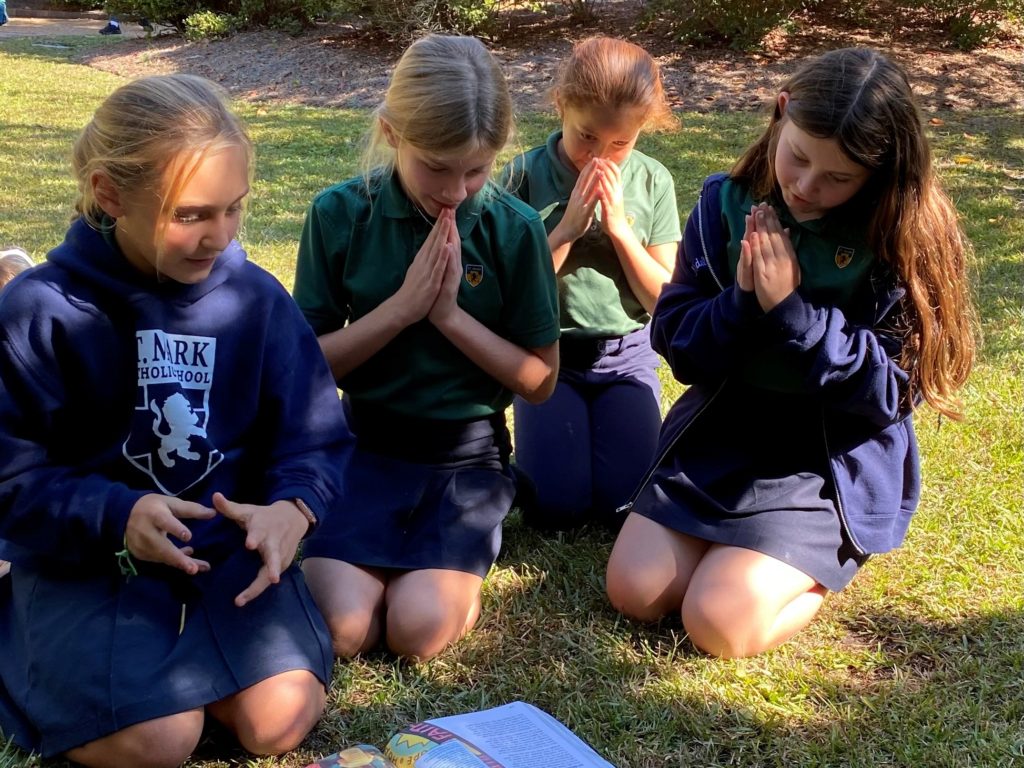St. Mark Catholic School follows the instructional standards set forth by the Diocese of Raleigh.
Catholic Schools exist so that curriculum may be taught in the light of Gospel teachings. Teachers must reinforce Gospel truths and values so that students may serve as witnesses to their Catholic faith. The Values and Attitudes will help students develop a critical conscience in every content area. Values and Attitudes are not necessarily quantifiable but rather identified in a student’s respect toward the content area.
- All people are created with minds and the gift to reason.
- God makes each of us as a unique individual.
- Recognize our talents and share them with one another in order to do God’s will.
Religion
“Faith must be known, celebrated, lived, and expressed in prayer. Catechesis comprises six fundamental tasks, each of which is related to an aspect of faith in Christ.” (National Directory of Catechesis, No. 20) The Diocesan Religion Curriculum is rooted in these six fundamental tasks: Knowledge of Faith, Liturgical Education, Moral Education, Teaching to Pray, Education for Community Life, and Missionary Initiation.
Each of the six tasks is delineated into two components: Essential Concepts, which are the broad categories repeated in every grade; and, Core Content that indicates specific knowledge students will recognize, know or be able to articulate at their grade level. It is important to recognize that certain elements of our faith are revisited in greater depth at each grade level of the Curriculum.


Mathematics
All students should have the opportunity and the support necessary to learn significant mathematics with depth and understanding whereby ideas are linked to and build on one another so students’ understanding and knowledge deepen and their ability to apply mathematics expands. Effective mathematics teaching requires understanding what students know and need to learn and then challenging and supporting them to learn it well. They must learn mathematics with understanding, actively building new knowledge from experience and previous knowledge.
Mathematics reflects the order and unity in God’s universe. Our society depends upon the use of Science, Technology, Religion, Engineering, Art and Math. It relies upon a mathematical knowledge which assists students in developing the ability to reason, think critically, and logically. All students will develop practical tools for daily living and the ability to discover creative ways to solve problems.
Assessments should support the learning of important mathematics and furnish useful information to both teachers and students.
English/Language Arts (ELA)
Language Arts instruction is essential for a student to attain a high level of literacy and to function as an informed member of the school and broader community. To communicate effectively, a student must be able to apply skills in reading, writing, listening, and speaking. Because communication instruction crosses all disciplines, the opportunity to apply processes and skills must be provided in all content areas.
The primary goal of the Curriculum Standards is to ensure that students are introduced to the language skills necessary to think critically, communicate effectively and reach high levels of literacy in all content areas. The curriculum is aligned to the Common Core Standards adopted by the North Carolina Department of Public Instruction.
The curriculum is enhanced by specific Values and Attitudes unique to students in Catholic schools. For ELA instruction:
- Recognize and articulate Gospel values in literature.
- Develop an appreciation for stories from other cultures and religions.
- Recognize social justice themes.
- Listen and speak with respect.
- Writing must reflect a respect for others consistent with Christian values.
Strands are the five general areas of focus common to every grade.
- Strand A Values and Attitudes
- Strand B Reading (Key Ideas and Details; Craft and Structure, Integration of Knowledge and Ideas; Range and level of Text Complexity; Print Concepts; Phonological Awareness; Phonics and Recognition; Fluency)
- Strand C Writing (Text Types and Purposes; Production and Distribution of Writing; Research; Range; Handwriting)
- Strand D Speaking and Listening (Comprehension and Collaboration; Presentation of Knowledge and Ideas)
- Strand E Language (Conventions; Vocabulary Acquisition and Use)
All students in Grades K – 8 will participate in the Student Writing Journey. This program serves as a vehicle for students to receive teacher feedback and engage in self-reflection.

Science
Our science curriculum focuses on the following objectives outlined in our Diocesan curriculum which is aligned with the North Carolina Essential Standards for all grades. In addition to these standards and objectives, the middle school aligns the standards and objectives with the Next Generation Science Standards (NGSS) that is a national set of standards for STEM and engineering practices. The middle school also embraces engineering practices with annual Regional and State Science Fair participation and competition.
- Morals and Values as objectives for all grade levels:
- All living things are dependent on their environment to sustain life.
- The Earth is dynamic and resilient, yet fragile and finite.
- Demonstrate a respect for all forms of life and a growing appreciation for the beauty and diversity of God’s world.
- Demonstrate responsible and ethical behavior that exemplifies Catholic values, including respect for all life.
Social Studies
The Curriculum standards are aligned to the North Carolina Essential Standards (NCES), the National Standards for Social Studies identified by the National Teachers of Social Studies (NTSS) and the National Standards for Geography.
The six Social Studies strands provide a knowledge base for the student to understand the role and responsibilities of an active citizen from a historic perspective. Catholic gospel values establish criteria for the student to understand and critique what has been and what can be. Students will be prepared to make informed civic decisions and be active, value-focused citizens in a culturally diverse, interdependent world, with a global perspective, and an understanding of economic development with social analysis skills. There is a strong focus on utilizing literacy skills to help sharpen critical thinking and strengthen both written and oral communication.
Strands are the six overarching areas that connect topics throughout grade levels:
- Strand A Values and Attitudes
- Strand B History
- Strand C Geography and Environmental Literacy
- Strand D Economics and Financial Literacy
- Strand E Civics and Governance
- Strand F Culture


Information and Technology
The Standards for Information and Technology are woven throughout the content area coursework. The values listed below will help students develop a critical conscience in the use and application of information and technology skills.
- Work cooperatively with peers when using technology. (K-2)
- Understand the impact of information and technology on society. (3-8)
- Understand the place of technology in everyday life and basic issues related to responsible use of technology. (3-8)
- Demonstrate responsible and ethical behavior that exemplifies Catholic values when using information technology, including respect for property, honesty and compassion.
- Appreciate electronic communications as a means to enhance learning and realize the consequences of misuse.
